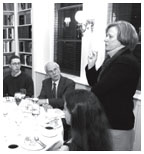Have an opinion about this issue of PAW? Please take a minute to click here and fill out our online questionnaire. It’s an easy way to let the editors know what you like and dislike, and how you think PAW might do better. (All responses will be kept anonymous.) |
April 6, 2005: President's Page
Speaking at PIIRS’ inaugural conference. Seated from left to right are Quinton Mayne, Ph.D. candidate in politics; Professor Charles Maier, Harvard University; and Professor Linda Weiss, University of Sydney. (Photograph by Jon Roemer) |
THE ALUMNI WEEKLY PROVIDES THESE PAGES TO THE PRESIDENT
Thinking Globally: the Princeton Institute for International and Regional Studies
The tsunami that caused such devastation on the fringes of the Indian Ocean generated ripples that reached the Atlantic seaboard of the United States. Though relatively few in number, Americans were among its victims, and countless Americans lent their personal or financial support to the worldwide effort to aid survivors. For me, this calamity underscored the importance of viewing our world as an interdependent whole, rather than as a disparate assortment of nations, regions, or people.
While international crises steal the headlines, actions are taken every moment of every day by governments, corporations, and other entities that have global ramifications. Moreover, as technological and transnational forces knit our world more closely together, the impact of these actions is becoming increasingly pervasive and immediate. It is essential, therefore, that our students acquire the knowledge and skills they need to function effectively within a global environment, whether this means placing international events in a geographical and historical context, communicating with other people in their own language, or handling cultural differences with sensitivity.
This imperative has underpinned the work of the Princeton Institute for International and Regional Studies (PIIRS), which was established in the summer of 2003 to promote and integrate the study of the world at Princeton. Thanks to the energetic leadership of Professor of Sociology Miguel Centeno, PIIRS has made its presence felt throughout our University community. This year, it is sponsoring more than 30 courses with an international focus, from “Elementary Hindi” to “Central Asia: History, Society, Politics,” and is supporting a dozen scholarly projects by our faculty. In 2003–04, 150 graduate students were awarded grants to assist them in their research and the writing of their dissertations, as well as the improvement of their skills in languages such as Mongolian, Swahili, Hebrew, and Arabic.
For their part, undergraduates have been given new means to immerse themselves in foreign languages and cultures, as well as to address concrete socioeconomic problems. To cite just one example, PIIRS arranged for four of our students to work with the Solidarity Center of the AFL-CIO, allowing them to study the effects of globalization on international labor. One student, Tiyona Taylor ’06, spent an unforgettable summer in Phnom Penh, where she investigated Cambodia’s garment sector and sent a stream of data back to Washington, D.C. PIIRS also has launched an Undergraduate Fellows Program, which creates a forum in which students can explore topics of mutual interest with faculty, graduate students, and visiting scholars. Among the highlights of 2003–04 was a day-long symposium on the challenges confronting contemporary China and a career fair that will, we hope, encourage students to give professional expression to their interest in international affairs.
Finally, in addition to its inaugural conference on the “State of the World,” PIIRS has sponsored or cosponsored a host of lectures, seminars, meetings, screenings, and other events that have brought the world to Princeton. Farther afield, PIIRS is seeking to establish an international network of educational institutions committed to fostering cooperative research and instruction. When it moves into its home in the newly refurbished Aaron Burr Hall this fall, PIIRS will also begin to define its own research agenda and sponsor a visiting fellows program that will give both American and foreign scholars an opportunity to study and teach at Princeton.
Professor Centeno is fond of saying that PIIRS aspires to “make the sum of international studies at Princeton greater than the impressive parts already here.” How PIIRS has positioned itself to achieve this objective is as important as the accomplishments I have described, and no less exciting. Rather than representing yet another specialized academic enterprise, PIIRS is designed to serve as a catalyst for a broad array of undertakings planned and carried out by others in the realm of regional and international studies. Using its financial resources in the manner of a venture capitalist, PIIRS provides departments, programs, and individual scholars and students with the incentive, as well as the necessary means, to pursue the questions that must be answered if Princeton is to serve all nations as effectively as our own.
The other defining feature of PIIRS is its multidisciplinary character. PIIRS was formed by combining the strengths of our Center for International Studies, with its emphasis on research and global issues, and our Council on Regional Studies, with its curricular and interregional focus, bridging the divide that often has isolated those who study the world as a whole from those who focus on specific nations or regions. PIIRS also has assembled a broad spectrum of faculty associates, representing obvious partners such as politics and international affairs, as well as fields with unexpected insights to offer such as music and ecology and evolutionary biology. The support that PIIRS extends to our faculty, both in terms of new courses and research projects, gives special weight to interdisciplinary ventures, and this emphasis is destined to grow still stronger in the years ahead.
In the course of its short existence, PIIRS has dramatically broadened
the scope of international discourse on our campus. Its actual investment
in courses, research, and international experience is relatively modest,
but its power to open minds to the global dimension of our lives is potentially
unlimited. ![]()



